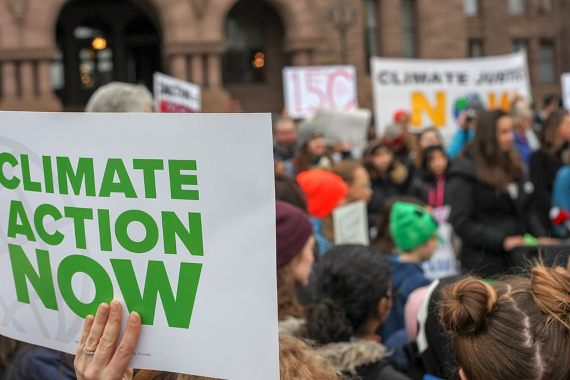In 1896, the Swedish physicist and chemist Svante Arrhenius warned of a rise in the greenhouse effect on Earth due to human-caused CO2 emissions, especially from the burning of fossil fuels; it was a vision far ahead of its time. It was not until 1958 that atmospheric measurements of this gas taken by the American geochemist Charles David Keeling at the Mauna Loa observatory confirmed what Arrhenius had predicted more than half a century earlier. And yet it is striking that for a proportion of the general public, concern about climate change and environmental sustainability is a relatively recent development: according to the Yale Program on Climate Change Communication’s annual US survey, in 2018 for the first time more than 60% of respondents acknowledged that climate change is primarily caused by humans, with less than 25% still believing that it is a natural phenomenon.

This reluctance on the part of a proportion of the public to accept the reality of anthropogenic climate change has undoubtedly been fuelled by the confusion caused by the denialist ideas and theories spread by certain sectors over the years. But this shift towards awareness of the most serious environmental crisis of our time does not necessarily equate to a greater move to action either; as environmental sociologists Robert Brulle and Kari Norgaard have written, climate change has become for many people a “cultural trauma” leading to “social inertia.” People’s mobilisation and commitment collide with a sense of powerlessness in the face of the overwhelming scale of the problem, which can lead to pessimism and inaction.
This is why it is important to emphasise how societal changes that can lead to a desired zero-emission, carbon-neutral future depend first and foremost on small-scale, individual action. In this series we will review the realities and myths about environmental sustainability and climate change actions that have a major impact at the international and global level, but which are strongly connected to the daily lives and responsible choices of individual people in the sphere of their own experience. This will be done through the critical prism of current scientific knowledge that rigorously analyses the different proposals to distinguish effective action from what may be just well-intentioned voluntarism but with little impact or viability, or even, on occasions, mere greenwashing to improve an organisation’s image.
Energy transition
Thus, we will review carbon neutrality objectives and their feasibility. Is it possible to achieve a net zero-emissions target, combining the reduction of CO2 discharged into the atmosphere with carbon sequestration? The United Nations (UN) has recently stressed the need for a coalition of countries to work towards the goal of carbon neutrality by 2050 as “the world’s most urgent mission.” The European Union and more than 110 countries, including the US, have committed to this goal, and even China has advocated reaching it by 2060. In total and according to the UN, the states that emit more than 65% of greenhouse gas (GHG) emissions and account for more than 70% of the world economy have joined. And yet, at the same time, the UN itself warns that the main climate indicators are worsening. How will the world and people’s lives change, or how should they change to achieve this ambitious goal? Is carbon neutrality an impossible utopia?

One of the key aspects of this road ahead is energy transition. While we have been hearing about the end of oil for years, it is only recently that even the major producers of the black gold have begun to recognise that perhaps, with the COVID-19 pandemic as a major turning point, the peak growth in demand for fossil fuels is behind us. But alongside the great movement of nations and policies towards renewable sources of clean energy, and the technological innovations that seek to promote their greater sustainability, there are numerous implications of this transition on the lives of ordinary people: how will we heat and cool our homes through more environmentally friendly technologies? Will we see a universal energy transition that does not penalise the more modest economies?
Another example of the risks of creating or widening economic disparities can be found in the basic necessity of transport. Climate urgency has accelerated the reinvention of the automobile, born of the oil boom. But despite the growing penetration of sustainable mobility, the still relatively high price of electric and hybrid models threatens to leave the private car only within the reach of the wealthiest, as it was in its early days. The same is true for air travel: if air fares become more expensive due to emissions from commercial aviation, will flying become a luxury for the few? And in any case, will environmental awareness require us to reduce this travel option?
The impact of consumption habits
But even more numerous are the ramifications for ordinary people of this shift towards a more sustainable model of society. Consumption habits have a huge impact on economic and industrial activity, and therefore also on GHG emissions. Experts insist that a gesture as simple as what we choose from supermarket shelves can provide a major boost to reducing emissions, favouring plant-based and low environmental impact foods; however, they also warn that not everything labelled as “organic” or “ecological” is always more sustainable.

On the other hand, the future demise of oil would put an end to the raw material of plastic, an omnipresent material in our lives. The pandemic has been a stumbling block on the road to reducing plastic consumption due to the increased use of disposable materials and single-use packaging; falling oil prices made it more profitable for industry to produce new plastics than to recycle existing ones, which has also dealt a blow to the growth of circular economies. While it is still difficult to envisage a life without plastic today, this is one more reason why waste separation and recycling is a powerful route to a more sustainable planet, in the face of the negative publicity these initiatives sometimes receive.
Despite all of the above, experts also warn us that it is not enough just to consume green, but that the transformation to a more environmentally friendly model also lies in the moderation of our consumption. In particular, the shifting of some of our habits towards digital environments may give the impression that this is always a net gain in terms of cutting emissions. However, many are unaware that digital technologies also have a considerable carbon footprint whose growth is predicted to be meteoric in the coming decades. In short, the path to environmental sustainability for our society is enormously complex, and sometimes not always in line with intuition; knowledge-based science and listening to informed voices are the keys to recognising the big ideas that will bring us closer to a more sustainable world.
Comments on this publication